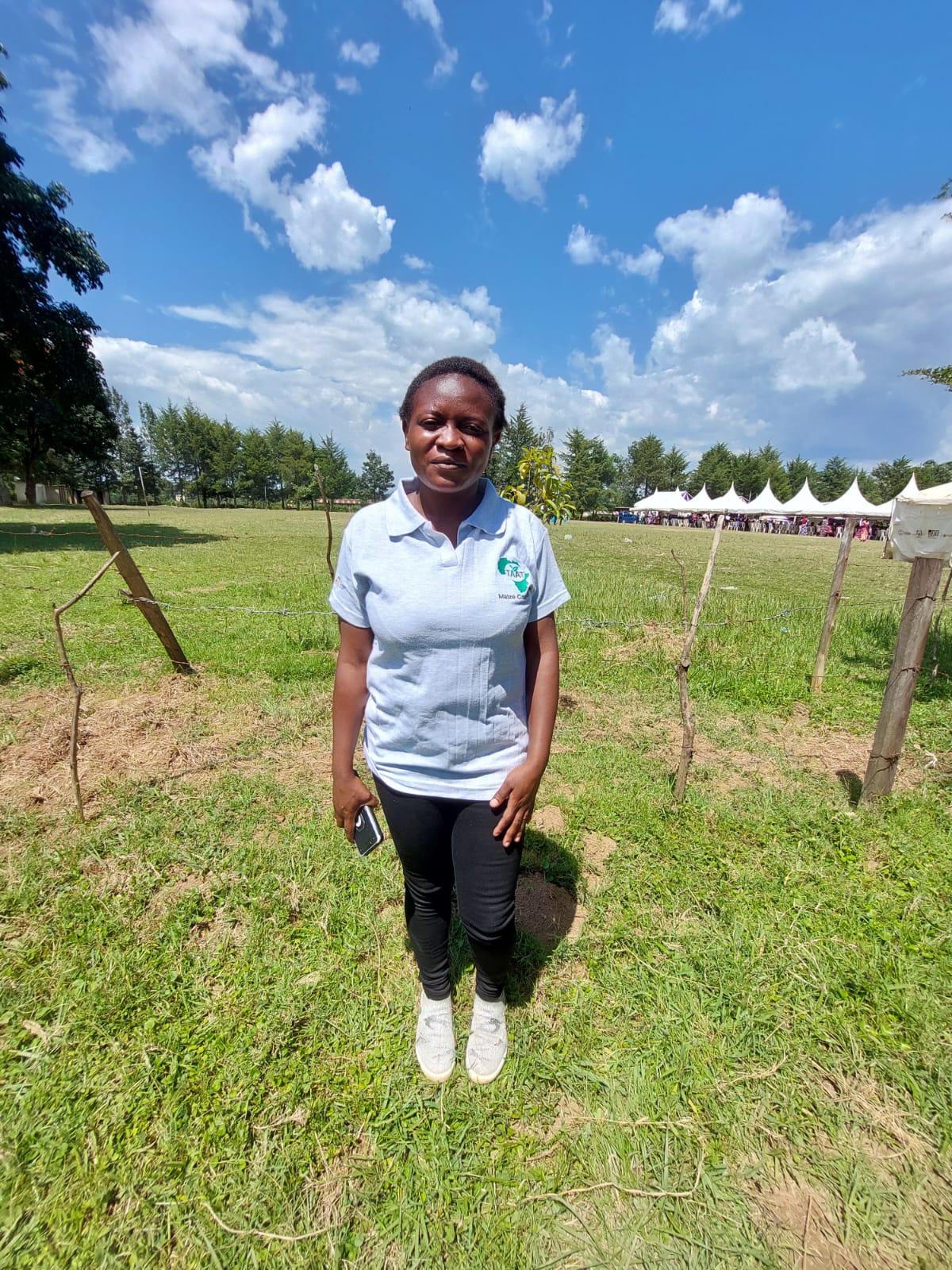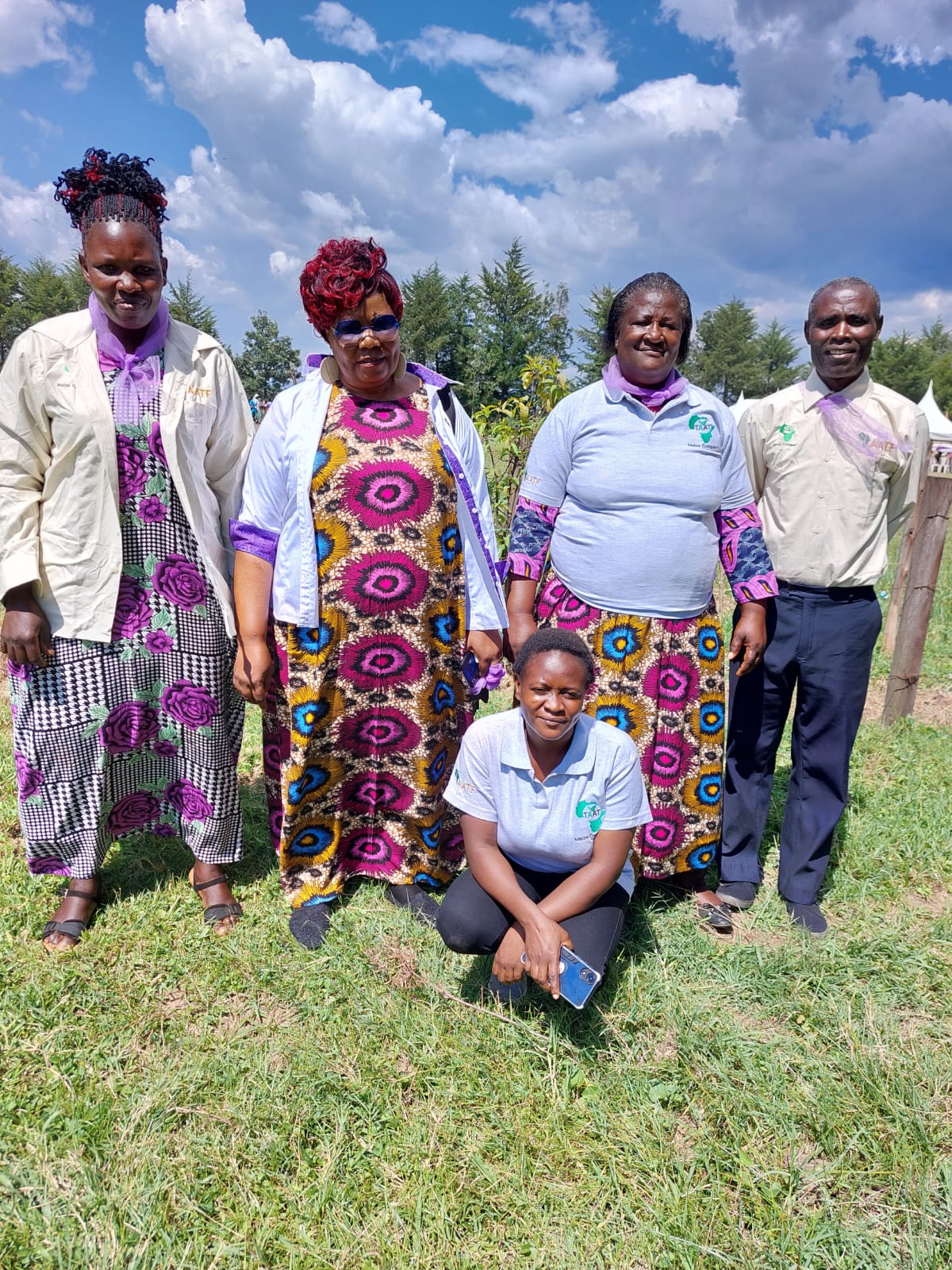
Twenty-five-year-old Edlqueen Anyiso’s story of resilience in growing drought-tolerant and climate-smart maize varieties aptly embodies a determined, young small-scale farmer out to improve her livelihoods. She shared her inspiring journey with a team from AATF during a recent visit to Western Kenya, in an event that brought together over 200 women to learn about the benefits of growing DroughtTEGO maize hybrids, which AATF is promoting through TAAT. The event allowed women farmers to exchange their successful agricultural practices and improve maize productivity in the region.
In 2018, Anyiso, a resident of Ikolomani in Kakamega County in Western Kenya, found herself at a loss, unsure of what to do with her life and that of her unborn daughter. Her situation seemed bleak. Having recently completed her secondary education, she was pregnant and facing a series of challenges. The father of her child had abandoned her, and tragically, her beloved mother had passed away. Anyiso was left in the care of her father, who had moved on with his life and remarried. Unfortunately, she felt like an outsider in this new family dynamic, unwanted and unable to find her place.
She explored all her options, but none seemed to work out – from working as a house help, a security guard, and even as an untrained Early Childhood Development Education (ECDE) teacher. She desperately needed to do something to change her economic situation. While searching for sustainable means of livelihood, a friend introduced her to Margaret Awinja, the coordinator of WEREFANET, a community-based organization that partners with AATF in technology deployment. Awinja introduced her to maize farming, and that’s when her life began to take a positive turn and outlook.However, there were hurdles she needed to overcome since she did not have any land of her own. Awinja took on the role of mentor and stood by her side throughout. She assisted her in finding a ¾ acre of land that she could lease to plant the drought-tolerant maize that was already receiving positive feedback from farmers in the area. With limited savings from her house help job, she did not have enough money to pay for the land. Awinja helped her negotiate with the landowner, provided her with seeds and fertilizer to start her farming venture, and also introduced her to other farmers who supported and guided her through the entire process of planting maize – from land preparation to weeding and harvesting.
While waiting for the crops to mature, Anyiso engaged in other jobs to earn money. She worked as a security guard at night and as an ECDE teacher during the day in the nearest town. This was to cater for herself, her child, and to pay for labor to weed her maize. At the end of the season, she was able to harvest 15 bags of maize from the leased ¾ acres of land. The maize was valued at KES 60,000/ $450. She used the proceeds from the sale of the 15 bags, which she sold to a school, to pay off her debts, open a bank account, and pay fees for her brother. She was also able to lease the same land for the next season and pay for labor for tilling and planting. Awinja and other farmers taught and encouraged her to save money in a bank account after every season. In her second season of planting, she was able to get a similar amount of maize, which she sold and put some of the money into savings. By 2023, she had saved close to KES 200,000/$1,400. This was enough money for her to apply for her dream course – a diploma in ECDE at the nearby Eregi Teachers College, where she is currently astudent.

Anyiso’s farming endeavors, however, are not without challenges. Community members, including some youth, keep jeering at her, telling her that farming is not work for a young and beautiful girl like her. They suggest she should find someone to marry her. Additionally, people have been stealing her maize when it’s green and when it’s dry and ready for harvesting. Hired labor also takes advantage of her gender and age to do shoddy work. The persistent pests and diseases, especially the fall army worm, have also posed a challenge. However, she has been able to manage them with recommended pesticides.
Anyiso urges parents to support their youth who are interested in farming and to also give land to them especially the girls who are usually left out of the equation. She encourages youth who are idle waiting for something better to do to try farming as it’s profitable if one is committed and patient.
Her experience in farming has taught her to be resilient and not to give up. If she didn’t agree to go into farming, she probably would not be where she is now in school and able to take care of her child she says. “Maize farming and mentorship from Awinja and other farmers saved me from stress and depression that was slowly creeping in on me. Farming gave me hope,” she emphasizes. “I probably would never have handled the amount of money I have so far, had I not gone into farming” she adds. Currently, she is trying for find a way on how to balance going to college and continuing with maize farming as she does not want to give it up. Indeed, her mentors’ investment in her both in time and other resources have accelerated her progress.


















































































